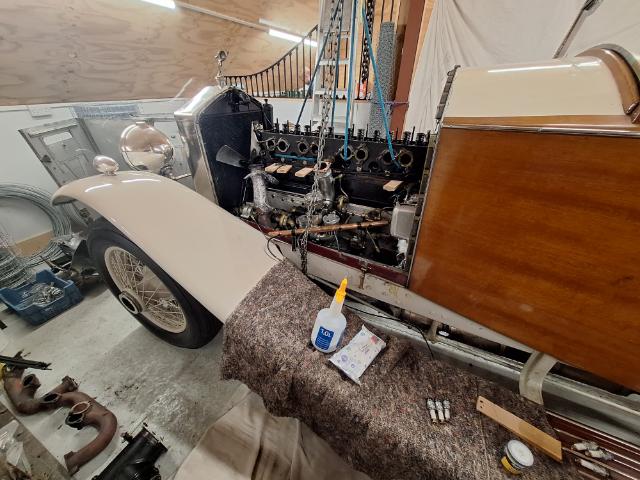
Classic Cars and Asbestos: Ensuring Safe Restoration and Compliance for International Transport
Classic cars capture the spirit of a bygone era, but many vehicles built before the 2000s contain hidden hazards in the form of asbestos. A once-common material in automotive manufacturing, asbestos was used for its fire resistance and durability but is now known for the severe health risks it poses. Identifying and removing asbestos in classic cars is critical not just for safety but also for complying with strict international regulations, especially when transporting vehicles abroad.
Where Asbestos May Be Found in Classic Cars
Classic cars can contain asbestos in various components, including but not limited to:
- Brake Pads and Linings: Asbestos was widely used in brake systems to handle the heat generated during braking.
- Clutch Linings: The clutch system often incorporated asbestos to provide durability and resistance to wear.
- Gaskets and Seals: Asbestos gaskets were used in engines and exhaust systems due to their ability to withstand high temperatures.
- Heat Shields: Components protecting against heat, such as shields near the exhaust manifold, often included asbestos.
- Underbody Coatings and Insulation: In some cases, asbestos was used in soundproofing and thermal insulation under the car body.
Disturbing these parts during restoration, maintenance, or disassembly can release hazardous asbestos fibres into the air, posing significant health risks.
International Laws Regulating Asbestos in Imported Cars
Several countries have enacted strict laws prohibiting the import of vehicles containing asbestos. These regulations are particularly relevant for classic car enthusiasts planning to ship their vehicles overseas:
- Australia:
- Australia enforces a total ban on asbestos, making it illegal to import any items containing the material, including vehicles. Classic cars are inspected upon arrival, and vehicles found to contain asbestos may face delays, fines, or rejection. Removal must be conducted before shipment.
- New Zealand:
- Similar to Australia, New Zealand has stringent rules under its Customs and Excise Act and Health and Safety at Work Act, requiring all imports to be free of asbestos.
- United States:
- The US does not have a total ban on asbestos but enforces strict regulations under the Environmental Protection Agency (EPA). Classic car imports must comply with safety standards, and vehicle restoration often involves asbestos testing and removal.
- European Union (EU):
- The EU prohibits the production and sale of asbestos-containing products under its REACH Regulation (Registration, Evaluation, Authorisation, and Restriction of Chemicals). Importing vehicles with asbestos components can breach these laws, leading to penalties.
- United Kingdom:
- In the UK, the Control of Asbestos Regulations 2012 restricts the use of asbestos. While the importation of classic cars is allowed, any maintenance or restoration work must adhere to these safety standards.
Crucial Environmental’s Expertise in Asbestos Removal
At Crucial Environmental, we offer tailored solutions for identifying and removing asbestos from classic vehicles. Our services include:
- Asbestos Surveys and Testing
We conduct thorough inspections of classic cars to identify asbestos-containing materials (ACMs) in components such as brakes, clutches, and gaskets. Using UKAS-accredited laboratories, we confirm the presence of asbestos, ensuring accurate results. - Licensed Asbestos Removal
Our licensed professionals are trained to safely remove asbestos from vehicles while minimising risks. Whether preparing a car for restoration or international transport, our removal process complies with UK and international safety standards. - Compliance Support for International Shipping
Exporting a classic car? We provide the necessary documentation, including clearance certificates and compliance reports, to meet the stringent requirements of countries like Australia and New Zealand. We have successfully participated in over 300 vehicle exports to date, and this number continues to grow steadily - Replacement Solutions
Post-removal, we assist in sourcing modern, non-asbestos alternatives for your vehicle’s components, ensuring the car remains functional and authentic while adhering to safety standards.
Preparing Your Classic Car for International Transport
To ensure a smooth shipping process, follow these steps:
- Conduct an Asbestos Survey Early: Identify asbestos-containing materials during the initial stages of restoration.
- Replace Hazardous Parts: Work with licensed professionals to replace asbestos components with safe alternatives.
- Obtain Compliance Documentation: Ensure you have the necessary certificates and reports to meet the requirements of the destination country.
Why Choose Crucial Environmental?
With offices in Sussex and Nottinghamshire, Crucial Environmental provides asbestos management and removal services across the UK. Our expertise ensures that your classic car restoration or transport project is safe, compliant, and hassle-free.
Southern Office
01903 297818
